Related Research Articles

Geeta Dutt was an Indian classical and playback singer. She found particular prominence as a playback singer in Hindi cinema and Bengali cinema and is considered as one of the best playback singers of all time in Hindi films. She also sang many modern Bengali songs in the non-film genre.
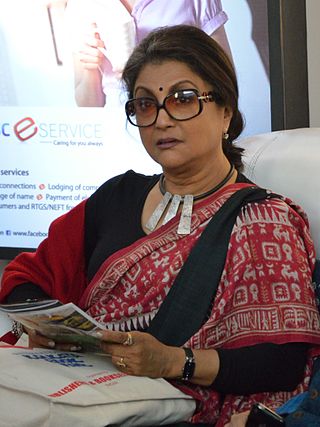
Aparna Sen is an Indian film director, screenwriter and actress who is known for her work in Bengali cinema. She has received several accolades as an actress and filmmaker, including nine National Film Awards, five Filmfare Awards East and thirteen Bengal Film Journalists' Association Awards. For her contribution in the field of arts, the Government of India honoured her with Padma Shri, the country's fourth highest civilian award.
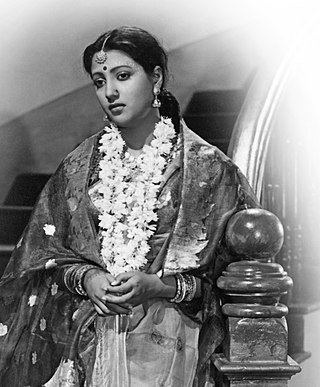
Suchitra Sen (Bengali pronunciation:[ʃuːtʃiːraːʃeːn] ; born Roma Dasgupta, widely known as the Mahanayika, was an Indian actress who worked in Bengali and Hindi cinema. The movies in which she was paired opposite Uttam Kumar became classics in the history of Bengali cinema.

Utpal Dutt was an Indian actor, director, and writer-playwright. He was primarily an actor in Bengali theatre, where he became a pioneering figure in Modern Indian theatre, when he founded the "Little Theatre Group" in 1949. This group enacted many English, Shakespearean and Brecht plays, in a period now known as the "Epic theatre" period, before it immersed itself completely in highly political and radical theatre. His plays became an apt vehicle for the expression of his Marxist ideologies, visible in socio-political plays such as Kallol (1965), Manusher Adhikar, Louha Manob (1964), Tiner Toloar and Maha-Bidroha. He also acted in over 100 Bengali and Hindi films in a career spanning 40 years, and remains most known for his roles in films such as Mrinal Sen’s Bhuvan Shome (1969), Satyajit Ray’s Agantuk (1991), Gautam Ghose’s Padma Nadir Majhi (1992) and Hrishikesh Mukherjee's breezy Hindi comedies such as Gol Maal (1979) and Rang Birangi (1983). He also did the role of a sculptor, Sir Digindra Narayan, in the episode Seemant Heera of Byomkesh Bakshi on Doordarshan in 1993, shortly before his death.
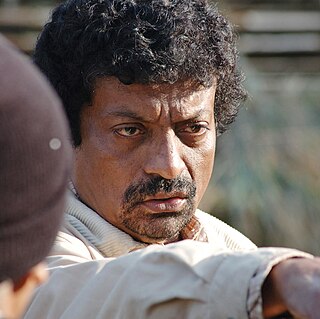
Goutam Ghose is an Indian film director, actor, music director and cinematographer who works primarily in Bengali cinema. He is the only Indian to have received the "Vittorio Di Sica" Award, Italy, in 1997.

Indian People's Theatre Association (IPTA) is the oldest association of theatre-artists in India. IPTA was formed in 1943 during the British rule in India, and promoted themes related to the Indian freedom struggle. Its goal was to bring cultural awakening among the people of India.
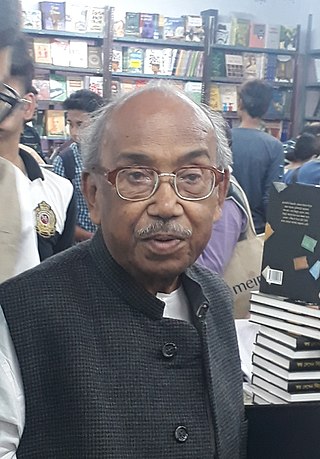
Tarun Majumdar was an Indian film director, documentary filmmaker, author, illustrator and screenwriter who is known for his work in Bengali cinema. He received five National Awards, seven BFJA Awards, five Filmfare Awards and an Anandalok Award. In 1990, the Government of India honoured him with the Padma Shri, the fourth highest civilian award. He is recognized as one of the greatest influential filmmakers of India. His few movies were restored and digitized by the National Film Archive of India, along with his Contemporaries Arabinda Mukhopadhyay, Goutam Ghose. He is Legendary filmmaker for Ganadevata in 1978, Nimantran in 1971,Palatak in 1963.
Saptapadi is a 1961 Indian Bengali-language Epic romantic drama film by Ajoy Kar, starring Suchitra Sen, Uttam Kumar, Chhabi Biswas and Chhaya Debi. Music direction and playback singing for Kumar voice was by Hemanta Mukherjee and in Sen's voice by Sandhya Mukherjee. The story is based on a 1958 same name novel by Tarasankar Bandyopadhyay. This is regarded as one of the greatest romantic film in the history of Bengali cinema. The film become highest grossing Bengali film in 1961. It was featured retrospectively at the 45th IFFI in the "homage section" of Indian panorama.

Sandhya Roy is an Indian actress and politician. She is known for her work in Bengali cinema. She is the recipient of BFJA Award for three times, and one Filmfare Awards East best actress for Ganadevata.
Bengal Film Journalists' Association Awards commonly referred as BFJA Awards, is given by The Bengal Film Journalists' Association. The BFJA is the oldest association of film critics in India, founded in 1937 to serve the developing film journalism and film industry.
Anil Chatterjee was an Indian actor in the Bengali cinema during the early fifties through the mid-nineties and is mostly remembered as a character actor. He acted or performed in about 150 movies, including a few in Hindi.

Padma Nadir Majhi is an Indo-Bangladesh joint production feature drama film directed by Goutom Ghosh from the novel of the same name, Manik Bandopadhyay's Padma Nadir Majhi, shows life of fishermen of the Padma River.

Sudhin Dasgupta was a prolific Bengali music director, lyricist, and singer. He worked in various other Indian languages, such as Hindi, Assamese and Oriya. His contribution opened a new horizon to the Bengali music for both the arenas of Bengali basic song as well as Bengali film song.
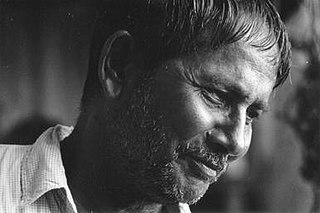
Rajen Tarafdar was an Indian film director, actor, and screenwriter. He was the recipient of two National Awards and two BFJA Awards.
Pijush Ganguly was a noted Bengali film, television and theater actor. In 2005 he received the Bengal Film Journalists' Association Award for the Best Actor in a Supporting Role for his performance in Mahulbanir Sereng.
Nabyendu Chatterjee was an Indian Bengali and Hindi film director and producer. A director of twelve feature films and three documentaries, Nabyendu has curved out a sure niche for him in the field of serious and useful cinema of India.
Subir Sen was an Indian playback singer who sang modern songs in Bengali and Hindi. He was also one of the artists of Rabindra Sangeet.

Satya Bandhyopadhyay was an Indian actor, known for his work in Bengali cinema. He acted in over 300 Plays, in numerous plays and performed frequently on the theatre.
References
- ↑ "Palanka (1975)". Indiancine.ma. Retrieved 6 January 2022.
- ↑ "PALANKA (1975)". BFI. Archived from the original on 28 October 2017. Retrieved 6 January 2022.
- 1 2 "23rd National Film Awards". International Film Festival of India. Archived from the original on 19 February 2014. Retrieved 31 October 2017.
- 1 2 "23rd National Film Awards (PDF)" (PDF). Directorate of Film Festivals . Retrieved 31 October 2017.
- ↑ Partitioned Lives: Narratives of Home, Displacement, and Resettlement. Pearson Education India. 2008. p. 68. ISBN 9789332506206 . Retrieved 4 November 2017.
- ↑ "Fribourg Film Festival has focus on Bengal". Bulletin on Film. Vol. XLIV, no. 4. RRTD, Ministry of Information and Broadcasting, Government of India. April 2000. Archived from the original on 21 July 2011. Retrieved 1 November 2017.